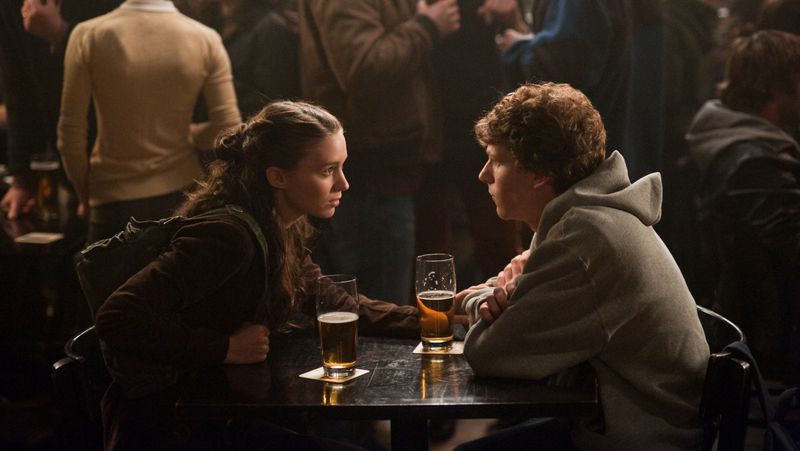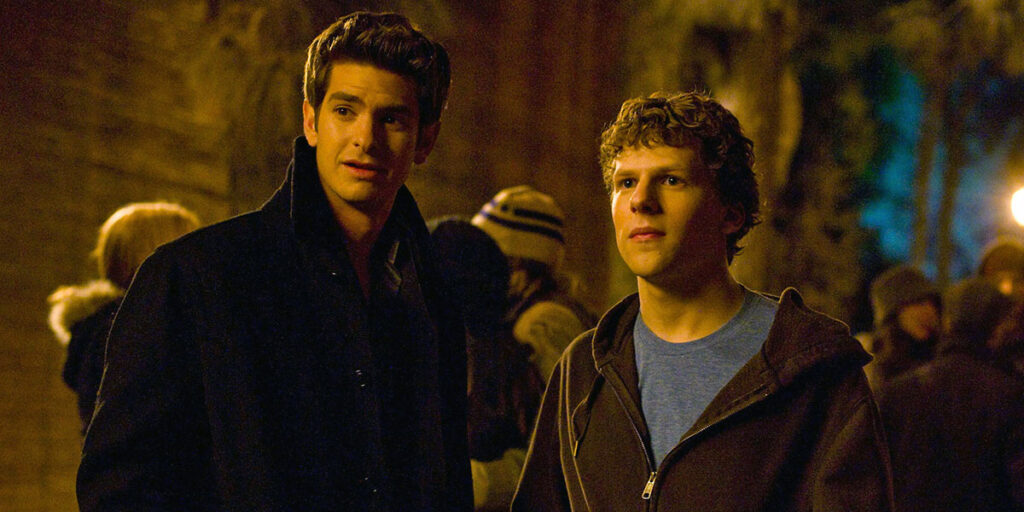The Social Network explores the origins Facebook and examines its founder, and remains a defining David Fincher film due to its direction, script, and score.
The Social Network accomplishes the near-impossible feat of defining both past and future generations. This David Fincher outing encapsulated the decade leading up to its release in 2010, while also serving as a warning for the decade that would follow. The message of how social media can be used to the detriment of others shines through the film’s direction, script, and music. This specific message about the potentially negative consequences of social media pinpoints the movie’s more universal themes: connection and isolation.
The drama follows young Mark Zuckerberg (Jesse Eisenberg), beginning with his time as a student at Harvard. Over the course of the movie, Zuckerberg and friend Eduardo Saverin (an excellent Andrew Garfield) develop what would become Facebook, the most famous social media platform in the world. The film also sees Zuckerberg in the midst of two lawsuits, one from the Winklevoss twins (both played by Armie Hammer), who claim Zuckerberg stole the idea of Facebook from them, and one from Saverin himself, who feels his former best friend had betrayed him.
David Fincher’s usual genre explorations made him a somewhat odd pick to direct The Social Network. Coming off projects like Se7en (1995), Fight Club (1999), and Zodiac (2007), Fincher was able to channel the dark energy from those projects and apply it to the story of Facebook’s founding. Fans have come to expect certain traits when viewing a Fincher film, including a thematic exploration of the human psyche. Here, he combines those explorations with the role technology has played, and will continue to play, in society. He utilizes a non-linear structure to examine Zuckerberg’s rise to prominence, his flaws, and his virtues.

The film, based on 2009 book “The Accidental Billionaires”by Ben Mezrich (with Saverin serving as a main source), takes liberties with this true story: the real Zuckerberg took issue with the film’s depiction of himself, particularly the party scenes, while Facebook co-founder Dustin Moskovitz has called it “a dramatization of history.” Though it may not be 100% accurate, the movie triumphs in another way: looking into the complex nature of intellectual property, friendship, and social media.
The script, written by the legendary Aaron Sorkin, acts as the glue holding the entire film together. One may look no further than the opening scene between Zuckerberg and his date, Erica Albright (Rooney Mara) to get a flavor for Sorkin’s rapid-fire dialogue and characterization. The scene, set to The White Stripes’ “Ball and Biscuit,” depicts Zuckerberg and Albright having a discussion over drinks. The conversation is fast paced, with Albright often struggling to keep up with Zuckerberg’s thought process. This leads to confusion, confrontation, and ultimately a break-up.
Sorkin’s script, in addition to driving the narrative, also serves an allegorical purpose: to showcase the confusion and confrontation that individuals may face in an online setting. He achieves this while also telling the audience something about the characters, especially Zuckerberg. The arrogance and detachment shown in this scene carries through to the end, where he sits alone at his computer screen, desperate for human interaction. There is much to dissect from this award-winning screenplay, but the core component is Sorkin’s ability to elevate this drama using clever dialogue and hidden messaging.
One overlooked aspect of The Social Network’s success lies in the film’s terrific score from Trent Reznor and Atticus Ross. The two men had done few scores at this point in their careers, and they were able to use their inexperience as an advantage, creating a truly unique musical sound for the film. Perhaps the most famous piece for the score is “Hand Covers Bruise,” a piece that consists mostly of a few simple piano notes, with persistent, lurking, buzzing strings sound in the background. “Hand Covers Bruise,” along with the rest of the score, accurately conveys both a need to prove oneself and a sense of profound loneliness. Zuckerberg’s loneliness is touched on throughout the entire film, and the score accurately reflects his status.
Fincher’s direction, Sorkin’s script and the musical score are just three examples of the mastery on display in The Social Network. This is a film that warrants further analysis, as the ramifications of social media have become even more clear since the movie’s release in 2010. How human beings connect, and how they can become isolated based on a variety of factors, is the key question at the heart of The Social Network. As time changes, and technology continues to evolve, these universal questions will continue to live on. This fact alone makes the film a timelessly relevant classic.
The Social Network is now available to watch on digital and on demand. Find out why The Social Network explores a side of college life not usually seen in movies in the article below!
Loud and Clear Reviews has an affiliate partnership with Apple, so we receive a share of the revenue from your purchase or streaming of the films when you click on the button on this page. This won’t affect how much you pay for them and helps us keep the site free for everyone.

